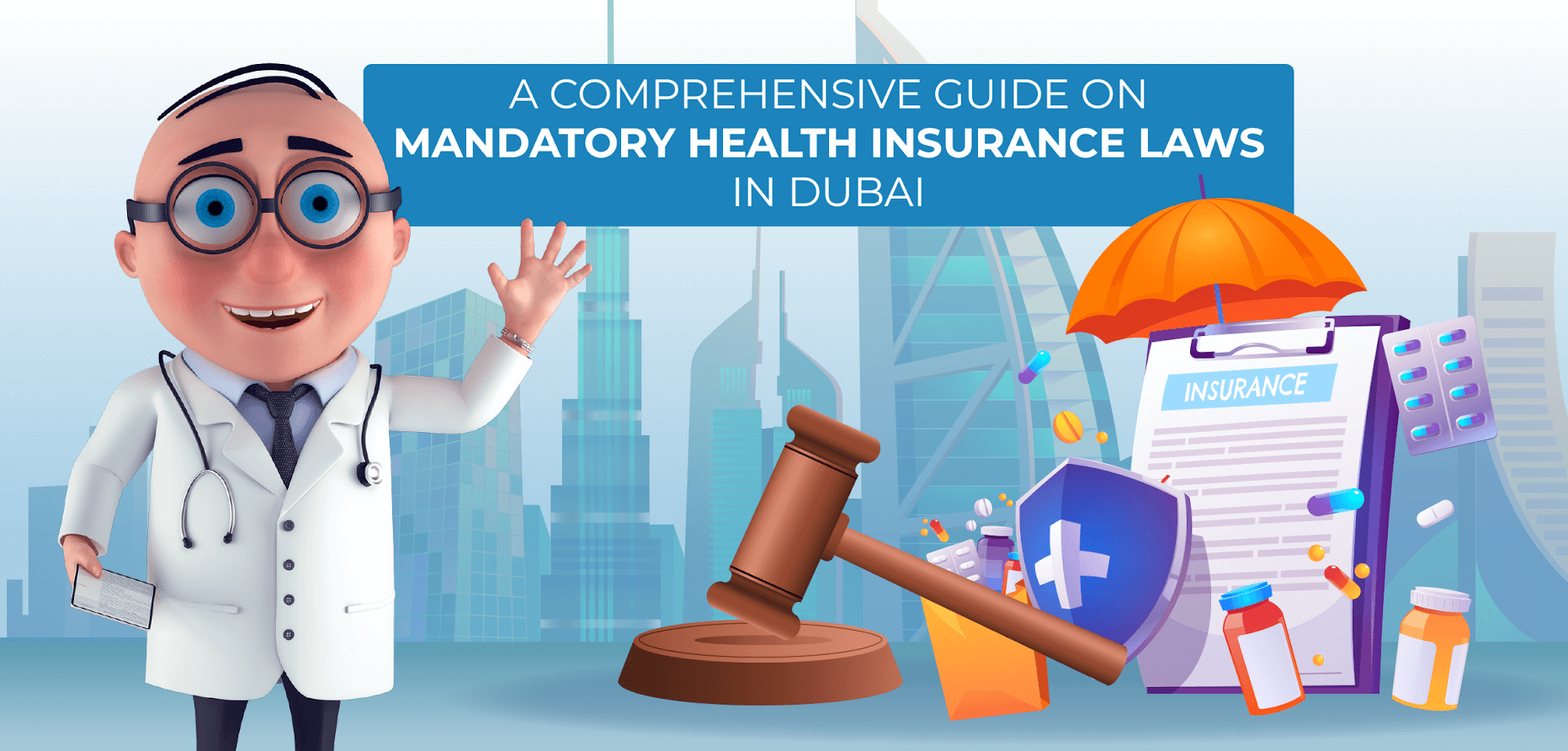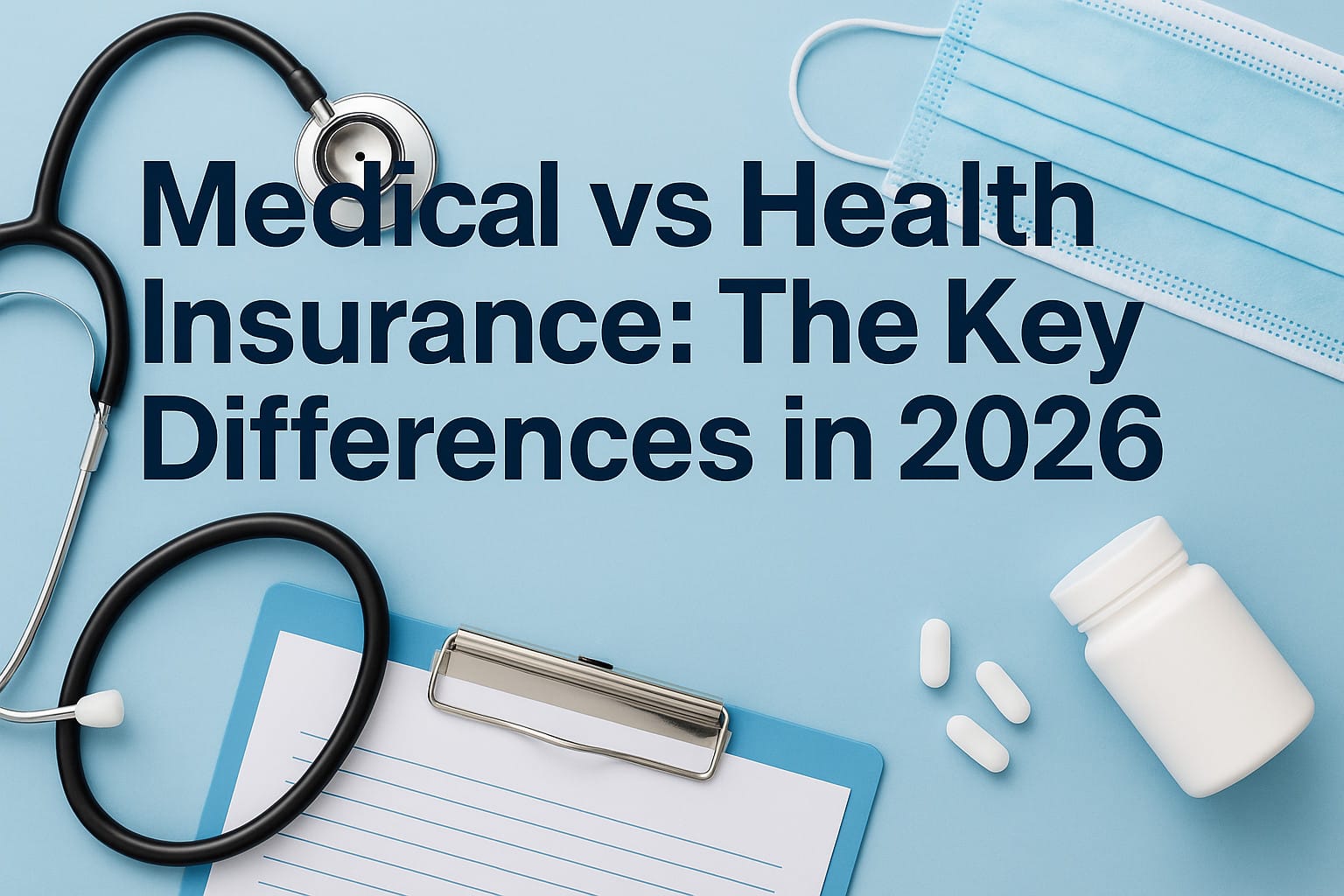Is health insurance mandatory in UAE? Yes, in the UAE, all residents are required to have health insurance, as per the health insurance law UAE regulations established by the local governments of each emirate. This UAE mandatory health insurance requirement aims to ensure that everyone living in the country has access to quality healthcare services and financial protection against unforeseen medical expenses. Having a policy in place helps you comply with the law, avoid penalties, and maintain a valid residency status.
Hence, as an expatriate or resident in the United Arab Emirates (UAE), it is essential to understand the legal requirements surrounding mandatory health insurance in Dubai and other emirates. Many ask, “Is health insurance mandatory in Dubai?” and “Is medical insurance mandatory in Dubai for dependents?” This all-inclusive guide will provide you with a detailed overview of the various legal compliances concerning health insurance in the UAE, helping you make informed decisions and ensure that you and your dependents have access to quality healthcare services.
Purpose of Mandatory Health Insurance
The primary goal behind mandating health insurance is to guarantee equitable access to top-notch healthcare services to all residents, free from any financial strain. This requirement promotes a healthier society and contributes to the overall well-being of the nation.
Regulations by Emirate:
Health insurance requirements are governed by the respective local governments of each emirate. Understanding the specific regulations applicable to your emirate of residence is of utmost importance. Here is a detailed overview of health insurance regulations in some of the UAE’s key emirates:
Health Insurance Regulations by Emirate
Health insurance requirements are governed by the respective local governments of each emirate. Understanding the specific regulations applicable to your emirate of residence is of utmost importance. Here is a detailed overview of UAE mandatory health insurance regulations in some of the UAE’s key emirates:
Dubai: Understanding Medical Insurance Mandatory Requirements
Regulatory Authority: Dubai Health Authority (DHA)
Keep remaining bullet points with keyword insertions:
- Mandatory Health Insurance: The Dubai medical insurance law makes health insurance compulsory for all residents, including expatriates and their dependents. Is medical insurance mandatory in Dubai? Yes, the medical insurance law in Dubai applies to everyone residing in the emirate.
- Employer Responsibilities: Employers must provide health insurance coverage for their employees which meets or exceeds the DHA’s minimum coverage requirements under the medical insurance Dubai mandatory regulations.
- Dependent Coverage: Sponsors are required to provide health insurance for their dependents, including spouses, children, and domestic workers. This addresses the common question: is medical insurance mandatory in Dubai for dependents? The answer is yes.
Minimum Coverage: Basic health insurance plans must cover inpatient and outpatient treatments, maternity care, and emergency services, with a minimum coverage limit of AED 150,000 per annum as per medical insurance mandatory in Dubai laws.
Abu Dhabi Health Insurance Requirements
- Regulatory Authority: Department of Health (DoH)
- Mandatory Health Insurance: Health insurance is compulsory for all residents, including UAE nationals, expatriates, and their dependents.
- Employer Responsibilities: Employers are required to provide health insurance coverage for their expatriate employees and their dependents.
- Thiqa Program: UAE nationals are covered under the government-funded Thiqa program, which offers comprehensive health insurance benefits.
- Minimum Coverage: Health insurance plans must include coverage for inpatient and outpatient treatments, maternity care, and emergency services, with a minimum coverage limit of AED 250,000 per annum.
Sharjah Health Insurance Requirements
- Regulatory Authority: Sharjah Health Authority (SHA)
- Mandatory Health Insurance: Health insurance is compulsory for all residents, including expatriates and their dependents.
- Employer Responsibilities: Employers are required to provide health insurance coverage for their employees.
- Dependent Coverage: Sponsors are responsible for providing health insurance for their dependents, including spouses, children, and domestic workers.
- Minimum Coverage: Health insurance plans must cover essential healthcare services, including inpatient and outpatient treatments, maternity care, and emergency services.
Other Emirates: Ajman, Umm Al Quwain, Ras Al Khaimah, and Fujairah
- Regulatory Authority: Individual local governments of each emirate
- Mandatory Health Insurance: Health insurance is not mandatory in these emirates; however, it is highly recommended for residents to have adequate health insurance coverage.
- Employer Responsibilities: While not legally required, many employers in these emirates provide health insurance coverage for their employees.
- Dependent Coverage: Health insurance for dependents is not legally mandated, but it is advisable for sponsors to ensure that their dependents have adequate coverage.
The health insurance regulations for each emirate ensure that you comply with local laws and provide yourself and your dependents with access to quality healthcare services.
Understanding the UAE mandatory health insurance regulations for each emirate ensures that you comply with local laws and provide yourself and your dependents with access to quality healthcare services.
Visa Renewals
Health Insurance Requirements for Visa Renewals
Obtaining and renewing residency visas in the UAE requires compulsory health insurance under UAE mandatory health insurance regulations. The government requires valid health insurance coverage to ensure residents have access to quality healthcare services and financial protection against unforeseen medical expenses, making it clear that health insurance is mandatory in UAE for visa processes.
- Impact on Visa Processing: The absence of a valid health insurance policy may lead to delays in visa processing, as the authorities need to confirm that you meet the mandatory insurance requirements before issuing or renewing your visa.
- Visa Renewal Denial: In some cases, failure to maintain adequate health insurance coverage may result in the denial of your visa renewal application, affecting your legal status in the country and potentially leading to penalties or deportation.
- Visa Type and Health Insurance: The type of visa you hold (employment, family sponsorship, etc.) may impact the specific health insurance requirements you need to meet. Ensure that your policy meets the minimum coverage requirements as mandated by the local government of your emirate.
- Employer-Sponsored Insurance: If you have employer-sponsored health insurance, verify that the coverage meets the visa requirements and that the policy remains valid throughout the visa renewal process.
- Insurance Documentation: You might need to submit evidence of your health insurance coverage while requesting a visa renewal. This can include a copy of your insurance card, policy certificate, or a letter from your insurance provider confirming your coverage.
- Dependent Visa Renewal: If you are sponsoring dependents, ensure that their health insurance coverage also meets the visa requirements. Failure to provide adequate coverage for dependents can also lead to delays or denial of visa renewal.
- Timely Renewal: Renew your health insurance policy on time to avoid any gaps in coverage, which may impact your visa renewal process. Set reminders for your policy’s expiry date and initiate the renewal process well in advance.
The importance of health insurance in obtaining and renewing residency visas in the UAE ensures that you maintain a valid legal status in the country and avoid any potential issues arising from non-compliance with mandatory insurance regulations.
Penalties for Non-compliance of Health Insurance Laws
There are serious consequences if you fail to meet mandatory health insurance in Dubai and other UAE emirate requirements. Understanding these penalties helps residents comply with health insurance law UAE regulations.
- Fines: Failing to comply with the mandatory health insurance requirement can result in substantial fines, depending on the emirate’s specific regulations.
For example, in Dubai, non-compliant residents may face fines of AED 500 per month. In Abu Dhabi, fines can range from AED 300 to AED 500 per month for each uninsured individual. - Visa Issues: Non-compliance with health insurance requirements can lead to visa-related problems, such as delays in visa issuance, denial of visa renewal, or even cancellation of your current visa. This can affect your legal status in the UAE and may result in deportation in extreme cases.
- Restricted Access to Healthcare Services: Without valid health insurance, you may face difficulties accessing healthcare services, as providers might require proof of insurance before offering treatment. This can lead to delays in receiving necessary medical care and potentially higher out-of-pocket expenses.
- Employer Penalties: Employers who fail to provide adequate health insurance coverage for their employees may face fines, penalties, and even the suspension of their business license. In Dubai, for example, employers can be fined up to AED 10,000 for failing to insure their employees.
- Sponsor Penalties: Sponsors who do not provide health insurance coverage for their dependents, including spouses, children, and domestic workers, may face fines and penalties. In Dubai, sponsors can be fined AED 500 per month for each uninsured dependent.
- Legal Consequences: Non-compliance with mandatory health insurance requirements can lead to legal consequences, such as being sued by healthcare providers for unpaid medical bills or being held liable for medical expenses incurred by uninsured dependents.
- Reputational Damage: Failure to comply with health insurance regulations can damage your reputation, both as an individual and as a business, as non-compliance may be seen as an indication of negligence or lack of responsibility.
To avoid these penalties and consequences, it is crucial to ensure that you, your employees, and your dependents have valid health insurance coverage that meets the minimum requirements set by the local government of your emirate. By staying informed about the regulations and maintaining continuous coverage, you can avoid penalties and ensure access to quality healthcare services in the UAE.
By understanding these legal requirements surrounding UAE mandatory health insurance and ensuring that you and your dependents have adequate coverage, you can navigate the residency process smoothly and secure access to the country’s world-class healthcare services.
In the next topic, let’s explore the reasons for investing in a viable healthcare cover.







